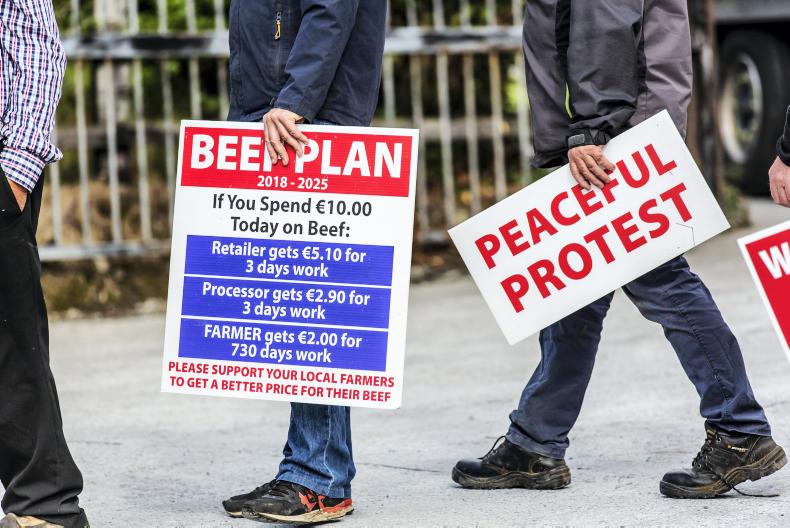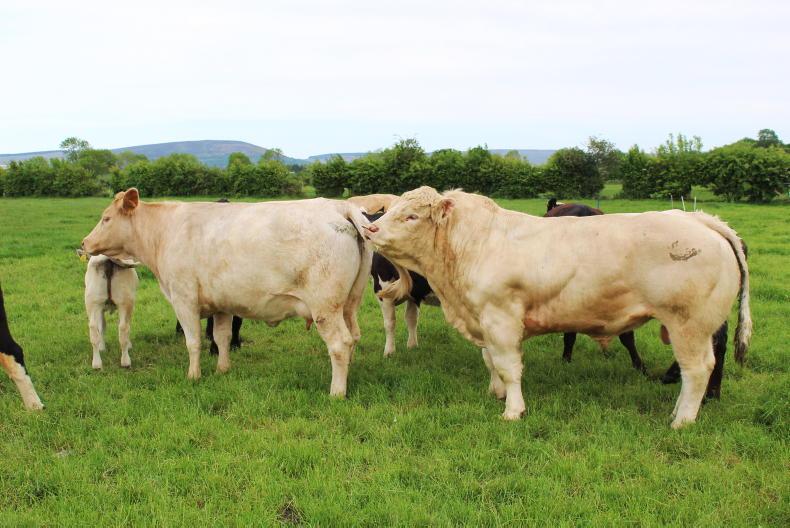What we are seeing at the gates of beef processors reflects years of inertia by key industry stakeholders in dealing with the real issues facing the suckler and beef sectors.
The despair shown by farmers on the pickets reflects the extent to which successive governments, numerous policy decisions and indeed the beef forum have left suckler and beef farmers to effectively wither on the vine.
While it has its critics, the reality is the Beef Plan Movement has embodied the despair felt by farmers. When it first floated the idea of holding pickets outside the gates of beef processors 12 days ago, many were sceptical as to its capacity to deliver. Some thought its resolve would break and normal service would be resumed within a few hours. The Beef Plan Movement has proved its critics wrong with active pickets taking place at 22 beef plants across the country.
Clearly leadership had the homework done before going to the factory gates. However, the movement now faces two very real challenges.

Firstly, at ground level, the challenge is to ensure it maintains control of its members across the pickets. There will undoubtedly be flash points given the tension on both sides. But if success is to be achieved, it is critical that those on the pickets do not allow any individual engage in activity that discredits the integrity of the cause. We have received numerous reports from farmers claiming to have suffered from intimidation and abuse on both sides. No one with any credibility would condone such behaviour. A situation where farmers are fighting with farmers must not be allowed to develop.
Secondly, as time moves on, attention will turn to what success looks like. Defining and executing its strategy presents one of the biggest challenges for the Beef Plan. What will farmers at the gates view as acceptable to stand down? It is a fine line between getting the credit for a price increase and being blamed for putting further downward pressure as a result of creating a backup of stock.
In the absence of last week’s pickets, it is likely we would have seen further downward pressure on prices this week. The slump in sterling over the weekend would have been seized upon by processors to reduce the base quote further. The problem is that few will see a stabilisation in price at a base of €3.45/kg as a success.
Meanwhile, the prospect of a no-deal Brexit, potentially one of the biggest shocks to the beef market in over a generation, is just 84 days away. It is a backdrop that will not only make it difficult for the Beef Plan to achieve the price increase being demanded by those on the picket lines but also prompt criticism from some circles for creating more uncertainty in an already highly volatile market.
The Government has to shoulder responsibility for the collapse of farmer confidence in processing
This, however, does not undermine the legitimacy of the Beef Plan’s grievance. In highlighting the plight of farmers, the Beef Plan has again exposed the complete lack of transparency in the sector. It is easy for Meat Industry Ireland (MII) to attempt to discredit the actions on the basis that current prices reflect the market. But the reality is, who – apart from the beef barons – knows if this is true?
Farmers have zero transparency into profits being made by processors that, due to curbs on live exports to the UK, are the only realistic outlet for farmers selling stock. We have a scenario where the ABP Food Group, Dawn Meats and Kepak have a dominant market share of cattle slaughterings in Ireland and the UK – the main export destination for Irish beef.
This position has been created by Irish and EU competition authorities giving the green light to mergers and acquisitions where the core consideration was the impact on the consumer with no regard for competition at farmer level. It is a flawed approach that requires urgent revision.
These private companies are not required to disclose their accounts yet can have the protection of operating as a limited company by being registered abroad. By allowing this, the Government is accepting that it is OK for legislation to allow the prosperity of over 100,000 farmers and indeed rural Ireland be dictated by three privately owned companies that can shelter their financial accounts.
Minister for Agriculture Michael Creed has been quick to say that, legally, he cannot intervene in the setting of beef prices. However, the Government does have to shoulder responsibility for the collapse of farmer confidence in the Irish beef processing industry. The minister may not be able to sort the market but if he was to establish an expert committee that would deliver increased transparency in the supply chain it would be a worthy service to farmers. It would also mark a successful outcome to the current standoff.
The Irish Farmers Journal has suspended all slaughtering of cattle and sheep from its Tullamore Farm.
Brexit: no-deal at the doorstep
It is clear from political statements in Dublin, London and Brussels this week that a no-deal Brexit is now almost inevitable. Whatever the political nuances, the reality is that a no-deal Brexit is Armageddon for farmers on the island of Ireland.
At this stage, with just 84 days to go, the Government and EU have to show their hand to give farmers some confidence that there is a plan ready to use on 1 November that will protect farmers. After a few weeks of a no-deal Brexit, farming will cease to be viable, particularly for the sectors most exposed to the UK market, with beef particularly vulnerable.
If there is no deal, the EU must suspend the beef offer to Mercosur and identify a fund that will offset the inevitable losses. The normal model of retrospective payments to reflect losses won’t be adequate given the scale of losses expected.
Farmers need the hard evidence now that the resources are in place to deal with what is truly a once-in-a-lifetime crisis that will make all the other difficulties experienced by farmers in recent years appear minor in comparison.
For farmers in Northern Ireland, it is a case of looking to Westminster and hoping that the Brexit fund recognises the unique problems that will be presented by an effectively closed border.
Global trade: all the costs but no protection
The Organisation for Economic Co-operation and Development (OECD) recently published an analysis of global agricultural polices. It identifies a stalling in the move away from what are deemed to be trade-distorting supports.
The findings reinforce the view that an increasing number of countries are prioritising the protection of domestic agricultural production over the need to comply with World Trade Organisation (WTO) regulations.
It is a significant development, particularly in the context of CAP reform, where the move away from market support measures and coupled payments to farmers has centred on complying with the WTO.
The analysis shows market price support measures within the EU to be below the OECD average. It comes as EU producer prices are shown to have fallen from 170% of the import/export price in the mid 1980s to just 105% by 2016-2018.
At the same time, agricultural productivity in the EU was identified to be just 30% of the world average.
The report clearly shows the extent to which farmers in the EU are expected to incur both the costs and productivity restrictions associated with meeting EU standards without any protection from global market prices.
Dairy: who is adding the value to milk prices?
Jack Kennedy compares the price paid by Irish processors against selected LTO milk prices, while Eoin Lowry looks at the financial performance of global players.
The obvious question is why the Dairygold, Glanbia and Kerry milk price is 94% of the LTO average in the same year that Ornua reported paying an average price back to processors for dairy products equivalent to 99% of the LTO average. Does this indicate the ability of the Ornua model to extract a higher price from the market than these co-ops are able to achieve on an individual basis? Or does the differential reflect the true cost of increasing processing capacity?
Tillage: Boortmalt malting
The loss of malting capacity at Boortmalt’s Athy facility has consequences for the full supply chain. Serious and wide-ranging decisions must be made as quickly as possible. These decisions need to be communicated clearly and distinctly in order to avoid loss of confidence arising from an issue that was not of the company’s making.
What we are seeing at the gates of beef processors reflects years of inertia by key industry stakeholders in dealing with the real issues facing the suckler and beef sectors.
The despair shown by farmers on the pickets reflects the extent to which successive governments, numerous policy decisions and indeed the beef forum have left suckler and beef farmers to effectively wither on the vine.
While it has its critics, the reality is the Beef Plan Movement has embodied the despair felt by farmers. When it first floated the idea of holding pickets outside the gates of beef processors 12 days ago, many were sceptical as to its capacity to deliver. Some thought its resolve would break and normal service would be resumed within a few hours. The Beef Plan Movement has proved its critics wrong with active pickets taking place at 22 beef plants across the country.
Clearly leadership had the homework done before going to the factory gates. However, the movement now faces two very real challenges.

Firstly, at ground level, the challenge is to ensure it maintains control of its members across the pickets. There will undoubtedly be flash points given the tension on both sides. But if success is to be achieved, it is critical that those on the pickets do not allow any individual engage in activity that discredits the integrity of the cause. We have received numerous reports from farmers claiming to have suffered from intimidation and abuse on both sides. No one with any credibility would condone such behaviour. A situation where farmers are fighting with farmers must not be allowed to develop.
Secondly, as time moves on, attention will turn to what success looks like. Defining and executing its strategy presents one of the biggest challenges for the Beef Plan. What will farmers at the gates view as acceptable to stand down? It is a fine line between getting the credit for a price increase and being blamed for putting further downward pressure as a result of creating a backup of stock.
In the absence of last week’s pickets, it is likely we would have seen further downward pressure on prices this week. The slump in sterling over the weekend would have been seized upon by processors to reduce the base quote further. The problem is that few will see a stabilisation in price at a base of €3.45/kg as a success.
Meanwhile, the prospect of a no-deal Brexit, potentially one of the biggest shocks to the beef market in over a generation, is just 84 days away. It is a backdrop that will not only make it difficult for the Beef Plan to achieve the price increase being demanded by those on the picket lines but also prompt criticism from some circles for creating more uncertainty in an already highly volatile market.
The Government has to shoulder responsibility for the collapse of farmer confidence in processing
This, however, does not undermine the legitimacy of the Beef Plan’s grievance. In highlighting the plight of farmers, the Beef Plan has again exposed the complete lack of transparency in the sector. It is easy for Meat Industry Ireland (MII) to attempt to discredit the actions on the basis that current prices reflect the market. But the reality is, who – apart from the beef barons – knows if this is true?
Farmers have zero transparency into profits being made by processors that, due to curbs on live exports to the UK, are the only realistic outlet for farmers selling stock. We have a scenario where the ABP Food Group, Dawn Meats and Kepak have a dominant market share of cattle slaughterings in Ireland and the UK – the main export destination for Irish beef.
This position has been created by Irish and EU competition authorities giving the green light to mergers and acquisitions where the core consideration was the impact on the consumer with no regard for competition at farmer level. It is a flawed approach that requires urgent revision.
These private companies are not required to disclose their accounts yet can have the protection of operating as a limited company by being registered abroad. By allowing this, the Government is accepting that it is OK for legislation to allow the prosperity of over 100,000 farmers and indeed rural Ireland be dictated by three privately owned companies that can shelter their financial accounts.
Minister for Agriculture Michael Creed has been quick to say that, legally, he cannot intervene in the setting of beef prices. However, the Government does have to shoulder responsibility for the collapse of farmer confidence in the Irish beef processing industry. The minister may not be able to sort the market but if he was to establish an expert committee that would deliver increased transparency in the supply chain it would be a worthy service to farmers. It would also mark a successful outcome to the current standoff.
The Irish Farmers Journal has suspended all slaughtering of cattle and sheep from its Tullamore Farm.
Brexit: no-deal at the doorstep
It is clear from political statements in Dublin, London and Brussels this week that a no-deal Brexit is now almost inevitable. Whatever the political nuances, the reality is that a no-deal Brexit is Armageddon for farmers on the island of Ireland.
At this stage, with just 84 days to go, the Government and EU have to show their hand to give farmers some confidence that there is a plan ready to use on 1 November that will protect farmers. After a few weeks of a no-deal Brexit, farming will cease to be viable, particularly for the sectors most exposed to the UK market, with beef particularly vulnerable.
If there is no deal, the EU must suspend the beef offer to Mercosur and identify a fund that will offset the inevitable losses. The normal model of retrospective payments to reflect losses won’t be adequate given the scale of losses expected.
Farmers need the hard evidence now that the resources are in place to deal with what is truly a once-in-a-lifetime crisis that will make all the other difficulties experienced by farmers in recent years appear minor in comparison.
For farmers in Northern Ireland, it is a case of looking to Westminster and hoping that the Brexit fund recognises the unique problems that will be presented by an effectively closed border.
Global trade: all the costs but no protection
The Organisation for Economic Co-operation and Development (OECD) recently published an analysis of global agricultural polices. It identifies a stalling in the move away from what are deemed to be trade-distorting supports.
The findings reinforce the view that an increasing number of countries are prioritising the protection of domestic agricultural production over the need to comply with World Trade Organisation (WTO) regulations.
It is a significant development, particularly in the context of CAP reform, where the move away from market support measures and coupled payments to farmers has centred on complying with the WTO.
The analysis shows market price support measures within the EU to be below the OECD average. It comes as EU producer prices are shown to have fallen from 170% of the import/export price in the mid 1980s to just 105% by 2016-2018.
At the same time, agricultural productivity in the EU was identified to be just 30% of the world average.
The report clearly shows the extent to which farmers in the EU are expected to incur both the costs and productivity restrictions associated with meeting EU standards without any protection from global market prices.
Dairy: who is adding the value to milk prices?
Jack Kennedy compares the price paid by Irish processors against selected LTO milk prices, while Eoin Lowry looks at the financial performance of global players.
The obvious question is why the Dairygold, Glanbia and Kerry milk price is 94% of the LTO average in the same year that Ornua reported paying an average price back to processors for dairy products equivalent to 99% of the LTO average. Does this indicate the ability of the Ornua model to extract a higher price from the market than these co-ops are able to achieve on an individual basis? Or does the differential reflect the true cost of increasing processing capacity?
Tillage: Boortmalt malting
The loss of malting capacity at Boortmalt’s Athy facility has consequences for the full supply chain. Serious and wide-ranging decisions must be made as quickly as possible. These decisions need to be communicated clearly and distinctly in order to avoid loss of confidence arising from an issue that was not of the company’s making.











SHARING OPTIONS